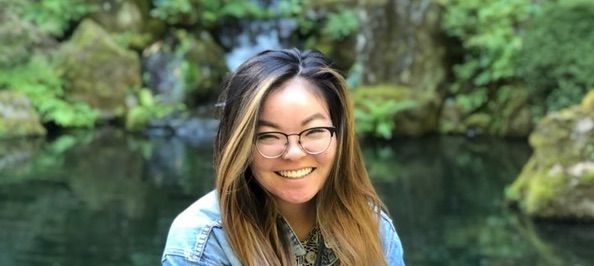Mentorship Spotlight: Elyse Kadokura, Starbucks
In this blog series to commemorate National Mentoring Month, we are celebrating some of our incredible mentors in the Data Science for All program.

Elyse Kadokura is a Senior Data Scientist at Starbucks, and a mentor for DS4A / Empowerment. She answered a few questions for us about her experience, career advice and creating more inclusive workplaces.
Tell us about a pivotal moment in your career: what was the backdrop, what did you do, what did you learn?
When I was in grad school for epidemiology I felt out of place because everyone else in my cohort was passionate about a specific disease, but I couldn’t find one that sparked my interest. During a summer internship, I had to learn a new programming language for an analysis, and I loved digging deeper into the methodology and the code. I realized that my passion was learning about different models and programming languages. I started incorporating data science methods into my epi work which led me to where I am today.
Who were your mentors and role models when you were starting out? What’s the best professional advice you received?
I’ve been immensely fortunate to have amazing mentors at Starbucks. My current boss is also a former epidemiologist turned data scientist, and she made me feel comfortable by sharing her knowledge about changing industries and professions. I used to be afraid to talk because I was terrified that people would think I wasn’t smart. She always told me to trust my instincts and if something doesn’t feel right or you’re confused about something, chances are other people feel the same way. Over time, my confidence has grown and I learn much more when I speak rather than staying silent. I’ve also been able to form stronger relationships with my peers and stakeholders. Always know that your voice is as important as everyone else’s in the room regardless if you’re new to a job/industry.
What have you gained from mentoring and coaching - both professionally and personally? Did anything surprise you when you started mentoring?
When I first became interested in switching from the public to the private sector, I started networking at different data science meetup groups and on LinkedIn. I talked to a lot of people who made the same transition and am forever grateful that they took the time to advise me. Now, I prioritize helping people in the same way. Professionally, we all gain when we work on teams with diverse backgrounds. There’s more thought sharing and innovation. If everyone thinks the same way, you open yourself up to massive blind spots. I am blown away by how much my mentees are accomplishing. Going to grad school while working a full-time job while doing this bootcamp. I never could have done so much at that point in my career. They inspire me and remind me why I became a data scientist in the first place.
Can you give us an example of how data skills are increasingly needed in your role and business?
There are a ton of intricacies that go into selling coffee at the scale that we do, and almost all of the decisions that we make can and should be data-driven. Some examples are: How can we forecast sales for a new store to plan for space and equipment needs? How do we make personalized product recommendations to customers? How do we automate supply chain ordering? These are all questions our data science teams are working to answer.
You’ll be mentoring a group of Fellows in our inaugural cohort in the Data Science for All/ Empowerment program, an initiative to create equal opportunities to access the data-driven jobs of tomorrow. What can individuals and organizations do to help create more diverse and inclusive workplaces?
Diversity at all levels is important but inclusion is the other half. If people don’t feel like they can be their authentic selves at work they won’t stay, so building that sense of belonging is also crucial. I’m part of a group of hard-working volunteers who are implementing I&D initiatives within our department. Some of the things we’re doing include building a mentorship program, hosting virtual volunteer events, setting up connects to get to get to know new coworkers, evaluating our hiring practices, bringing in facilitated bias workshops, and there’s a lot more. For organizations, please recognize and reward the people who are doing this work whether it’s factoring it into their performance review or tying it to compensation. Also, provide funding for trainings, additional headcount, speakers, etc. While verbally making a commitment to improving I&D is important, so is providing the resources to make it possible.





